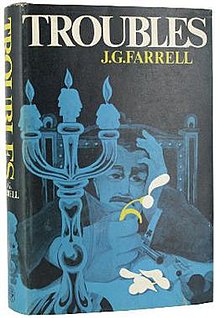Troubles (novel)
1970 novel by J. G. Farrell From Wikipedia, the free encyclopedia
1970 novel by J. G. Farrell From Wikipedia, the free encyclopedia
Troubles is a 1970 novel by J. G. Farrell. The plot concerns the dilapidation of a once-grand Irish hotel (the Majestic), in the midst of the political upheaval during the Irish War of Independence (1919–1921). It is the first instalment in Farrell's acclaimed "Empire Trilogy", preceding The Siege of Krishnapur and The Singapore Grip. Although there are similar themes within the three novels (most notably that of the British Empire), they do not form a sequence of storytelling.
 First edition | |
| Author | J. G. Farrell |
|---|---|
| Language | English |
| Publisher | Jonathan Cape |
Publication date | 1970 |
| Publication place | United Kingdom |
| Media type | Print (hardcover) |
| Pages | 446 |
| ISBN | 0-224-61900-4 |
| Followed by | The Siege of Krishnapur |
Troubles was well received upon its publication. It won the Geoffrey Faber Memorial Prize and, later, the Lost Man Booker Prize. It was adapted into a made-for-television film in 1988, starring Ian Charleson and Ian Richardson.
In 2010, Sam Jordison in The Guardian called Troubles "a work of genius", and "one of the best books" of the second half of the twentieth century.[1] "Had [Farrell] not sadly died so young," Salman Rushdie said in 2008, "there is no question that he would today be one of the really major novelists of the English language. The three novels that he did leave are all in their different way extraordinary."[2]
The novel concerns the arrival of the English Major Archer, recently discharged from the British Army, at the Majestic Hotel on the County Wexford coast in south-east Ireland in 1919. Both the hotel, and the town in which it is situated, Kilnalough, are fictional. Archer is convinced he is engaged, though sure he had never actually proposed, to Angela Spencer, the daughter of Edward Spencer, the owner of the hotel. She has written to him since they met in 1916 while on leave from the trench warfare of the Western Front.
The Spencers are an Anglo-Irish Protestant family, strongly Unionist in their attitudes towards Ireland's ties to the United Kingdom. Archer functions as a confused observer of the dysfunctional Spencer family, representing the Anglo-Irish, and the local Catholic population. As the novel progresses, social and economic relationships break down, mirrored by the gentle decay of the hotel.
Other characters include:
Farrell develops the insulated environment of the run-down hotel as a reflection on the attitudes of the historically privileged Anglo-Irish, in denial of the violent insurgency of the overwhelming majority (Nationalists/Republicans).
While the Irish War of Independence forms the background to the events of the novel, the political upheaval is not treated as a theme. Apart from occasional news reports concerning the war, the only references to it are chance remarks from the novel's characters. The novel's action takes place mostly within the hotel, with the remainder of the scenes taking place almost entirely in the surrounding areas. As a result, the only characters given a major airing are the Major and the Spencer family, which adds to the claustrophobic, unreal mood of the novel.
William Trevor said in The Guardian on 10 October 1970, that the novel was a "clever book" and "a tour de force of considerable quality."[3]
Vivian Mercier wrote in The Nation on 8 November 1971 that Farrell was "a born story-teller".[3]
In 1988, Troubles was adapted into a 208-minute film for television. Produced for LWT. The film stars Ian Charleson as Major Archer, Ian Richardson as Edward Spencer, and Emer Gillespie as Sarah.[4]
In 2010, Troubles was awarded the Lost Man Booker Prize, a one-time award chosen among books published in 1970 which had not been considered for the Booker Prize at the time.[5] The novel, one of six nominated for the 'Lost' prize, had missed out the first time around because rules about publication dates had changed that year.[6] On 19 May 2010, Troubles was declared the winner.[7]
Seamless Wikipedia browsing. On steroids.
Every time you click a link to Wikipedia, Wiktionary or Wikiquote in your browser's search results, it will show the modern Wikiwand interface.
Wikiwand extension is a five stars, simple, with minimum permission required to keep your browsing private, safe and transparent.